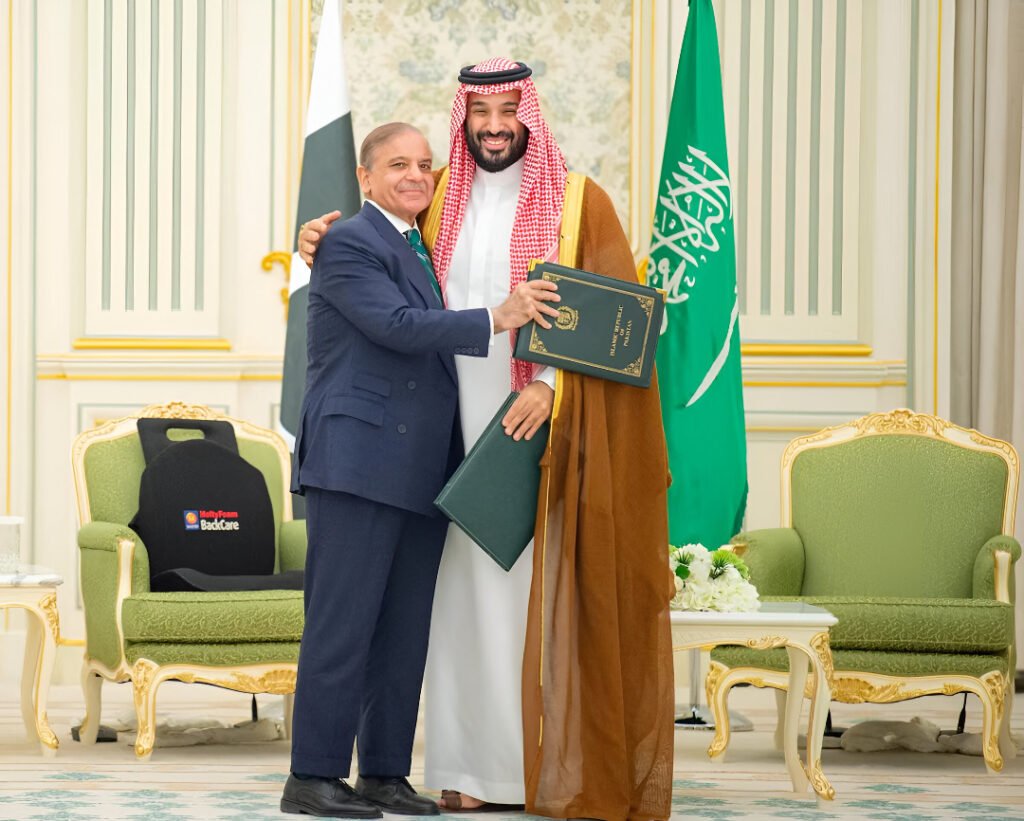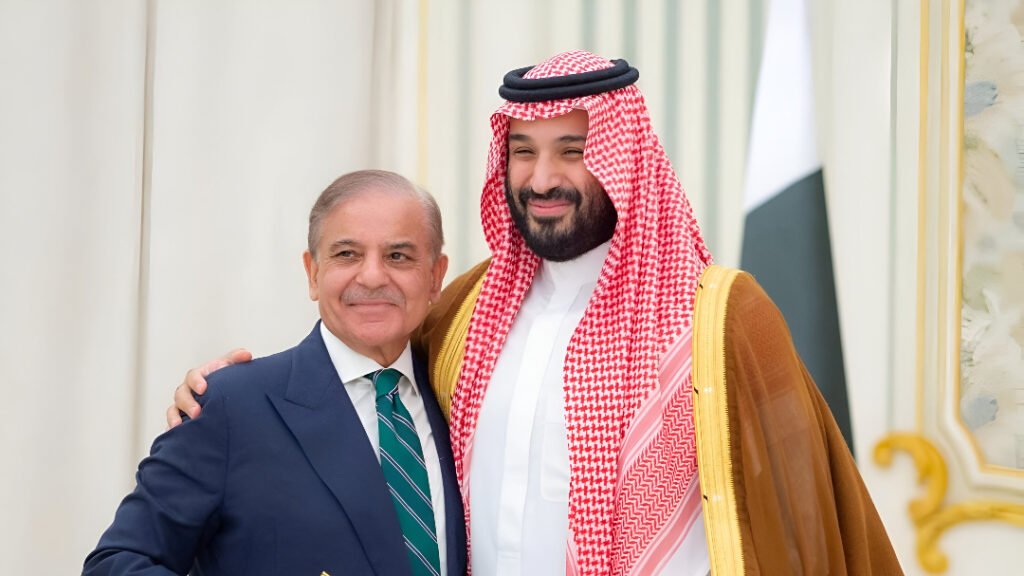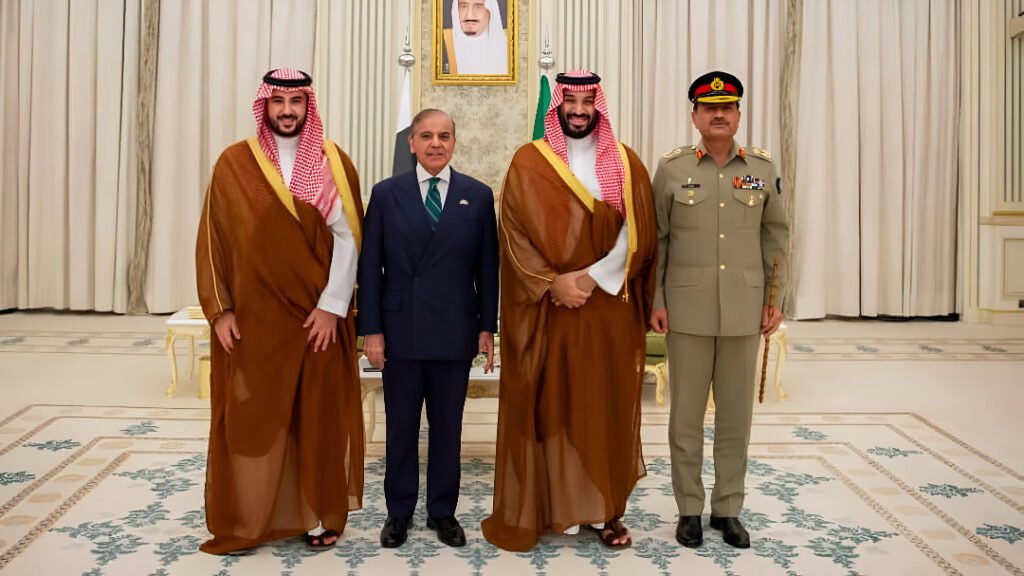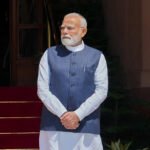In the era of shifting alliances and heightened geopolitical tensions, some treaties look less like normal diplomacy and more like volte-faces. The recently signed “Strategic Mutual Defence Agreement” between Pakistan and Saudi Arabia firmly falls into the latter category. More than signing on the dotted line, this agreement ties the two countries’ security into the other’s destiny, a step that might redefine power equations both in the Middle East and South Asia.
On September 17, 2025, on the occasion of Prime Minister Shehbaz Sharif’s official visit to Riyadh, the two nations signed an agreement stating that any act of aggression against one will be considered aggression against both. In simpler terms, if either country comes under attack, the other is obliged to step in.
For many, the news may sound dramatic. But for those familiar with the history of Saudi-Pak ties, it feels like a natural next step.

A Brotherhood Eight Decades in the Making
This agreement didn’t come out of nowhere; it is the formalization of nearly 80 years of friendship. Saudi Arabia has often been a lifeline for Pakistan in difficult times, from oil supplied on deferred payments to generous financial assistance and loans. Pakistan, in turn, has been Riyadh’s trusted partner in defense and security.
Think back to the 1980s, when Pakistani troops were stationed in the Kingdom, or to more recent years when the two countries worked side by side on counter-terrorism training. Military cooperation has always been the backbone of this relationship. With this treaty, that cooperation now carries the weight of an official security guarantee, comparable to NATO-style pacts.
The Ceremony in Riyadh
The agreement was signed at the grand Al-Yamamah Palace, with Crown Prince Mohammed bin Salman (MBS) and PM Sharif standing side by side. The joint statement highlighted not only their “brotherhood” but also their shared vision of contributing to regional and global peace.
Sharif didn’t arrive alone. He was flanked by a high-level delegation, including Foreign Minister Ishaq Dar, Defence Minister Khawaja Asif, Finance Minister Muhammad Aurangzeb, and Information Minister Attaullah Tarar. Their presence made it clear: this was not just about defense but also about wider economic and diplomatic cooperation.

Why Now?
The timing is crucial. The Middle East has been in upheaval following an Israeli strike in Qatar that killed senior Hamas commanders, sparking outrage across the Arab world. Pakistan, which has shown strong solidarity with Arab nations, had already sent Sharif to Doha twice within a week for emergency meetings.
In this context, the Saudi-Pak pact is more than symbolism. It signals unity among Islamic nations and serves as a warning to adversaries. For Riyadh, a formal alliance with Pakistan, a nuclear-armed nation with one of the world’s largest militaries, provides a useful deterrent layer. For Islamabad, it provides not just badly needed economic guarantees but also more leverage in regional geopolitics.
India’s Watchful Eye
Unsurprisingly, the development hasn’t gone unnoticed in New Delhi. India’s Ministry of External Affairs issued a carefully measured response, noting that the pact had been “under consideration for some time” and promising to study its implications for Indian security.
India and Saudi Arabia maintain strong commercial ties, and a large Indian diaspora lives in the Kingdom. But Saudi Arabia’s tilt toward Pakistan complicates the regional security picture, especially given the strained state of India-Pakistan relations. At the same time, analysts argue that Riyadh is unlikely to jeopardize its billion-dollar trade and energy links with New Delhi, suggesting that the Kingdom will continue walking a fine line.

What It Means Going Forward
Defense agreements are not merely ceremonial. They influence how nations respond to threats, build deterrence, and project strength. While neither Saudi Arabia nor Pakistan faces an immediate military attack, the pact makes one thing clear: aggression against either country will invite consequences from both.
To the ordinary citizen, the agreement might be far removed from everyday existence. Its ripple effect squeezed defense coordination, funds transfers, and stronger regional coalitions can have economic and security echoes in tangible ways. The acid test, however, will be whether this agreement is more than symbolic, through joint military exercises, intelligence sharing, and coordinated foreign policy.
Final Thoughts
The Saudi-Pak defense pact is not a treaty; it’s the result of decades of mutual trust, shared belief, and reciprocal need. It also marks the precarious power equation of a region where India, Iran, Israel, and others will be reconfiguring their own strategies.
Will such an alliance bring stability through deterrence, or will it complicate an already unstable situation? Only time will answer that question. For now, one message is crystal clear: when it comes to security, Pakistan and Saudi Arabia stand united.











